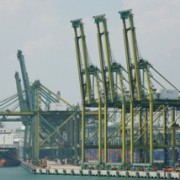Governance and public sector management
 Finance sector development
Finance sector development
 Regional cooperation and integration
Regional cooperation and integration
 Education
Education
 Finance sector development
Finance sector development
 Social development and protection
Social development and protection
 Finance sector development
Finance sector development
 Industry and trade
Industry and trade
 Finance sector development
Finance sector development
 Industry and trade
Industry and trade

Asia’s growth, production networks, and SMEs

The escalating Eurozone crisis and signs of spluttering world growth have put Asia and its manufacturing enterprises into the spotlight again. Part of Asia’s rapid trade-led growth over several decades is associated with production networks and a regional division of labor. An expanding literature suggests that the region’s trade is increasingly made up of growing intraregional trade in intermediate inputs (Athukorala 2011). Production activities are increasingly being geographically fragmented across countries and linked by a dense network of trade in intermediate goods (Baldwin 2008). Small- and medium-sized enterprises (SMEs) are viewed as the backbone of national economic development in many Asian economies, accounting for the majority of firms and a large share of employment (Harvie 2010).
Reforming the global financial architecture

The recent global financial crisis has renewed concerns about the inherent instability of the current international monetary system in which the world’s demands for asset or liquidity are met predominantly using the currency of one country, the United States dollar. If the supply of the global currency is inadequate to support global trade, the world faces deflationary risks. However, since the country issuing the global currency has the privilege of borrowing abroad in its own currency cheaply, its borrowing and, hence the supply of global currency, may become excessive. This may eventually become unsustainable, and may have significant systemic implications for the rest of the world, as witnessed in the global financial crisis.
It is time for binding agreements on migrants’ rights in Asia

Migration flows within Asia are of considerable size. According to the ILO (2006), between 1995 and 2000, 40% of the 2.6 million to 2.9 million Asian migrant workers (registered and undocumented) went to other countries in Asia, including the countries of the Gulf Cooperation Council (GCC) where Asian migrant workers made up 40% to 70% of the labor force in 2000. Unfortunately more recent data are not available, but the significance of intra-Asian migration constitutes a continuing trend. This post follows the definition of “Asia” used by the United Nations, which includes countries in the Middle East. The migration system in Asia is primarily based on temporary migration largely of low-skilled and semi-skilled workers, facilitated by private recruitment agencies (Wickramasekara 2006)
The PRC must invest in education for sustained development

Among the many challenges facing the People’s Republic of China (PRC) in the coming decades, the most important is its need to massively expand its investment in education. In an age of unprecedented levels of globalization, successful development has meant for the PRC, as for other countries, passing through three phases: Phase 1, joining the regional and global supply chains and production networks; Phase 2, imitating and adapting; Phase 3, innovating. These phases need not be mutually exclusive and may overlap.
Can internationalization of the renminbi succeed where internationalization of the yen failed?

Since the second half of the 1990s, Japan has tried to promote the use of the yen as an international currency but has made little progress so far. Now, following in Japan’s footsteps, the People’s Republic of China (PRC) is promoting the internationalization of the renminbi. It would do well to consider why Japan’s attempt at internationalizing the yen has failed. Until the Asian financial crisis in the second half of the 1990s, Japan was reluctant to promote the internationalization of the yen, fearing that capital flows could destabilize the economy and render monetary policy ineffective, a problem widely considered to be the major cost for a country promoting the international use of its currency.
Social enterprises can add a new twist to capitalism

The time has come to look at “social enterprises”—a form of capitalism that includes social and environmental objectives in addition to the profit motive. More than a century ago, Henry Ford asserted that “a business that makes nothing but money is a poor business.” The world is now overrun by such “poor businesses.” The heedless pursuit of financial gains may produce happy management teams and shareholders, but it also results in an unhappy planet for businesses to operate in. The solution is not for these businesses to give some money to charity, or to get employees to play “builder” or “teacher” for a day as part of so-called “corporate social responsibility” initiatives.
Fostering exchange rate coordination: the role of an Asian Currency Unit

Over the past few decades East Asia has become increasingly intertwined economically as the share of interregional trade in total trade has increased sharply across most economies, driven by regional supply chains and production networks. These production networks have also fostered greater investment links, with the production process being broken down into subprocesses within a particular industry. The high degree of economic integration indicates that there may be a case for exchange rate coordination, as exchange rate misalignments may result in loss of competitiveness for a country, possibly leading to an increase in protectionism, which in turn could promote a round of beggar-thy-neighbor devaluations. Large swings in bilateral exchange rates could influence decisions about the location of new and existing investments. In contrast, greater stability in exchange rates would support investment by increasing price transparency and reducing currency-related hedging costs for companies. Finally, sharp exchange rate movements in one currency could affect another country’s ability to maintain a particular exchange rate regime.
End of export-led growth would not be good for post-crisis Asia

The decades leading to the current global economic turmoil saw many developing countries attempt to pursue the East Asian development model, which is widely perceived to have been export-led. Is such growth possible in the post-crisis world with shrinking global imbalances? Historical data may provide useful clues. Our paper, titled "Can Asia Sustain an Export-Led Growth Strategy in the Aftermath of the Global Crisis? An Empirical Exploration", finds that Asian growth in the pre-crisis period was significantly correlated with the proportion of their manufactured exports that were sold in industrialized country markets. Given this evidence, Asian exports to other developing countries may not be good substitutes for their exports to developed countries. The policy implication is clear: a deceleration of exports to industrialized countries may limit prospects for post-crisis growth even if exports to other developing countries pick up the slack. Asian policy makers should, therefore, be more willing than ever to experiment with new paths to technological catch up.
What makes an effective international financial safety net?

The global financial crisis showed the need for a large-scale and effective international financial safety net (IFSN). Although East Asia has had a regional financial arrangement (RFA) since 2000 (the Chiang Mai Initiative1), it was not tapped during the global financial crisis for a variety of reasons. Our recent study examines the requirements for an effective IFSN. It should have adequate resources to deal with multiple crises, be capable of making a rapid and flexible response, and not be encumbered by historical impediments such as the IMF stigma that would limit its acceptance by recipient countries. Oversight of the IFSN needs to be based on cooperation between global and regional forums, for example, in the case of Asia, the G20 and ASEAN+3.
Dealing with the “noodle bowl” of Asia’s free trade agreements

East Asia’s attitude toward free trade agreements (FTAs) has changed. Slow progress in global trade talks has led to a surge in FTAs across Asia. With the World Trade Organization (WTO) Doha Round trade talks stalled, Asian countries see FTAs as a way of liberalizing trade and investment and sustaining economic recovery. The number of signed and implemented FTAs in the region has increased from three in 2000 to more than 60 in 2012, sparking concerns about an Asian “noodle bowl” of agreements. Critics worry about overlapping rules of origin (ROOs) requirements, which may be costly to business, especially small and medium-sized enterprises (SMEs), and argue that this wave of agreements will undermine the multilateral liberalisation process. A search for pragmatic and innovative ways to untangle the noodle bowl of Asia’s free trade agreements is needed.


Search
Subscribe / Connect to Asia Pathways
Subjects
- Accelerating Progress in Gender Equality
- Addressing Remaining Poverty and Reducing Inequality
- Agriculture and natural resources
- Capacity development
- Climate change
- Economics
- Education
- Energy
- Environment
- Finance sector development
- Gender
- Governance and public sector management
- Health
- Industry and trade
- Information and Communications Technology
- Infrastructure
- Making Cities More Livable
- Miscellaneous
- Population
- Poverty
- Private sector development
- Regional cooperation and integration
- Sanitation
- Social development and protection
- Strengthening Governance and Institutional Capacity
- Subjects
- Transport
- Uncategorized
- Urban development
- Video Blog
- Water
Recent Posts
- Investing in Childcare a Win for Women and the Economy
- Flush and Flourish: Upgraded Toilets Can Transform Lives in Rural Asia
- New Ways for Climate Finance and Development in Asia and the Pacific
- Rethinking High-Rise Living: Balancing Urban Growth and Sustainability in Asia’s Cities
- Navigating Linear Transport Infrastructure Through Conservation Landscapes




Recent Comments